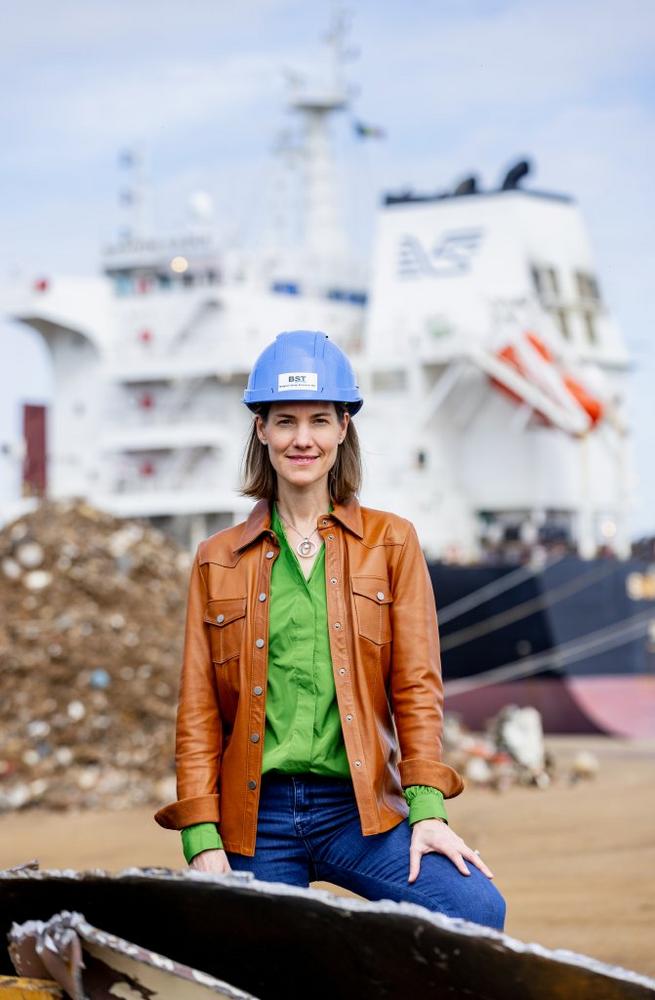ICM: Please present the activities of Belgian Scrap Terminal NV in a few words.
Caroline Craenhals:
Belgian Scrap Terminal boasts a rich heritage spanning over a century, originating from the vision of my great-grandfather and steadfastly remaining within the family’s stewardship ever since. As the fourth-generation custodian, I take immense pride in upholding our tradition of excellence in the recycling sector, whilst never stopping exploring new recycling techniques.
The Belgian Scrap Terminal Group stands for high-quality recycling. We are a Belgian family company in heart and soul, active at various locations in Western Europe. At the forefront of our industry, Belgian Scrap Terminal annually processes over one million tons of metal. We bring mountains of scrap back into the economic cycle as raw materials. In an era where recycling is imperative for both individuals and businesses, Belgian Scrap Terminal has devoted a century to pioneering "Urban Mining" as our core mission.
Through innovative methodologies, we meticulously extract and recycle both ferrous and non-ferrous materials, refining them into top-tier raw materials primed for reintroduction into the economy. Our annual accomplishments translate into staggering figures, equivalent to the weight of two Golden Gate Bridges or 200 Eiffel Towers, reaffirming our unwavering commitment to sustainable resource management. Aligned with the steel industry, Belgian Scrap Terminal assumes a pivotal role in the global transition towards green practices, safeguarding the finite resources of our planet and striving to illuminate a path towards a brighter future for forthcoming generations.
ICM: You are hosting the plant tour at IARC24, what will our delegates visit?
Caroline Craenhals:
At BST, we boast an urban mining facility, extracting valuable raw materials from waste. As you enter our plants in Antwerp and Willebroek, you’ll embark on a fascinating journey through time, where you will witness how goods from two decades ago are ingeniously repurposed into fresh raw materials within a mere hour. During the visit, we’ll delve into our world where advanced recycling techniques transform used ferrous and non-ferrous materials into top-quality raw materials.
ICM: How does BST navigate regulatory compliance and leverage recycled content, particularly with regulations like the End of Life Vehicles directive?
Caroline Craenhals:
As a recycling leader, Belgian Scrap Terminal (BST) occupies a unique position: we are time travelers, pioneers and the canary in the coal mine simultaneously.
As time travelers, we innovate and adapt, bridging the gap between past challenges and future solutions. By leveraging our expertise and embracing emerging technologies, we ensure that every vehicle’s end-of-life journey contributes to a sustainable circular economy. Our commitment to continuous improvement and environmental stewardship drives us to transform these challenges into opportunities, shaping a brighter, more sustainable future for generations to come.
As pioneers, we steer towards a sustainable future, emphasizing responsible practices. Balancing economic viability with ecological sustainability is key in our recycling investments, requiring careful consideration of costs and benefits. Through rigorous analysis, we align investments with profitability while preparing for regulations like the End of Life Vehicles EU Directive. Our impressive 97% recycling rate reflects the transformation from the unimaginable to the norm over the past quarter-century.
As the canary in the coal mine, we serve as the early indicator of economic shifts: slowdowns translate into reduced volumes for us. Consumers hold onto their vehicles and appliances for longer periods, and high interest rates dampen construction activity, resulting in diminished construction waste.
ICM: How does BST address challenges of resource scarcity and strategic autonomy in metal recycling, particularly through urban mining?
Caroline Craenhals:
Contemporary discourse revolves around challenges like climate change and strategic autonomy, particularly in raw material-dependent sectors. Europe’s self-sufficiency in critical resources like battery components and steel is under scrutiny amidst global dependencies and geopolitical shifts. Instead of pursuing new mining ventures, urban mining offers a potent ‚close-the-loop‘ alternative by utilizing waste streams for valuable resources. This approach not only addresses environmental concerns but also enhances strategic autonomy and resource security. Urban mining emerges as a crucial solution amid global scarcity and geopolitical tensions, positioning us as pivotal players in addressing challenges like resource scarcity, energy independence, climate action, and protectionism. By integrating urban mining with traditional mining practices, solutions lie within our grasp. Moreover, the notion that there is no need to fear resource shortages because everything is available underscores the potential of this approach.
ICM: How should the automotive and recycling sector adapt to evolving regulations and technological advancements while ensuring its competitive position in the global market?
Caroline Craenhals:
As we stand on the brink of innovation and progress in the recycling sector, it’s clear that we possess a wealth of knowledge and insights. AI integration is becoming increasingly vital, such as the global competition and the influx of Chinese cars into Europe, each with distinct batteries and economic models. Every technological advancement and piece of information represents a puzzle piece in the global scheme of sustainable development. While we may not yet see the full picture, collaborative efforts and dedicated research and innovation will help assemble the puzzle of a more sustainable future. Let’s unite our expertise and resources to complete this puzzle, paving the way for a greener, more environmentally conscious world.
Die ICM AG ist einer der international führenden Kongressveranstalter für das Themengebiet Recycling. Mit insgesamt vier Kongressen pro Jahr deckt ICM wichtige Bereiche der Kreislaufwirtschaft ab. Dazu zählen vor allem die Themen Elektro- und Elektronikrecycling, Automobilrecycling und Batterierecycling. Die Kongresse finden abwechselnd in verschiedenen Ländern Europas, in Nordamerika und in Asien statt. Eine Übersicht über kommende Kongresse finden Sie auf www.icm.ch.
ICM AG
Schwaderhof 7
CH5708 Birrwil
Telefon: +41 (62) 78510-00
http://www.icm.ch/
![]()
